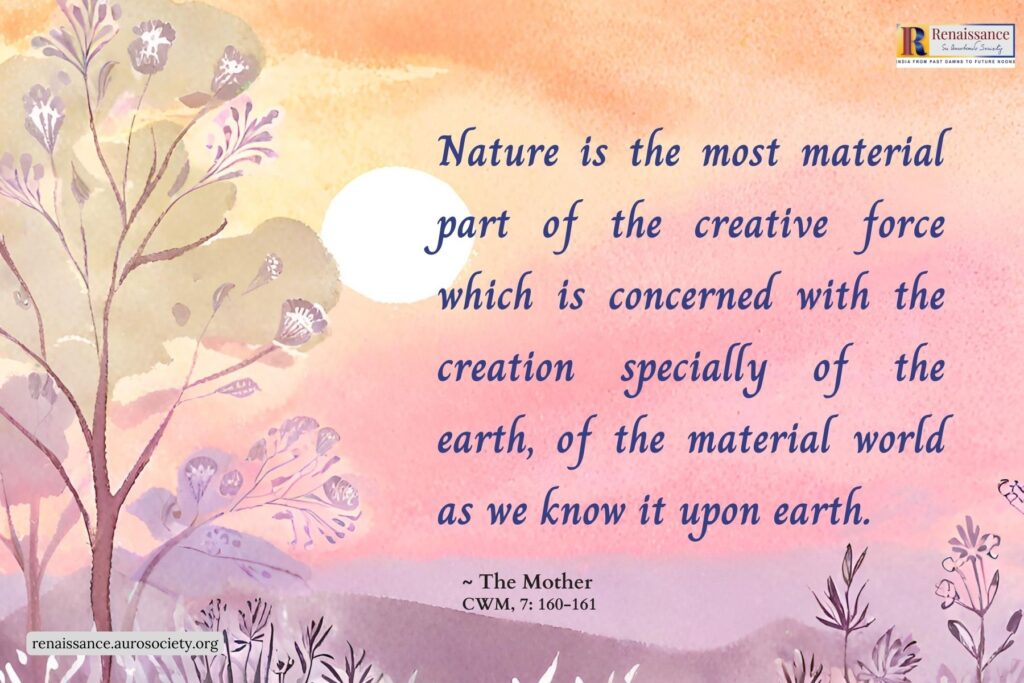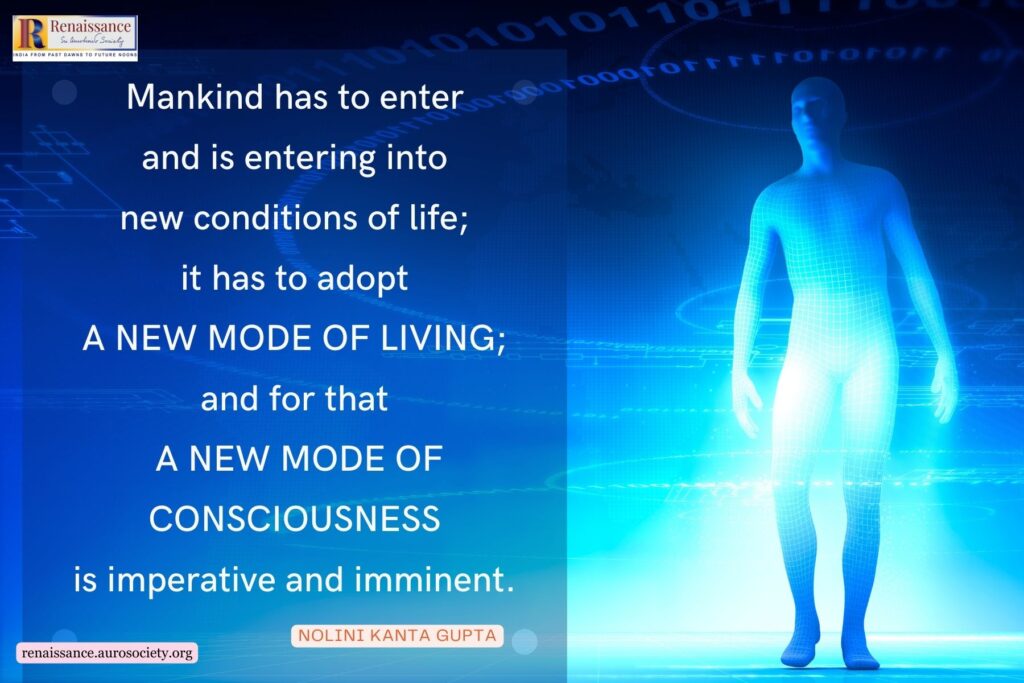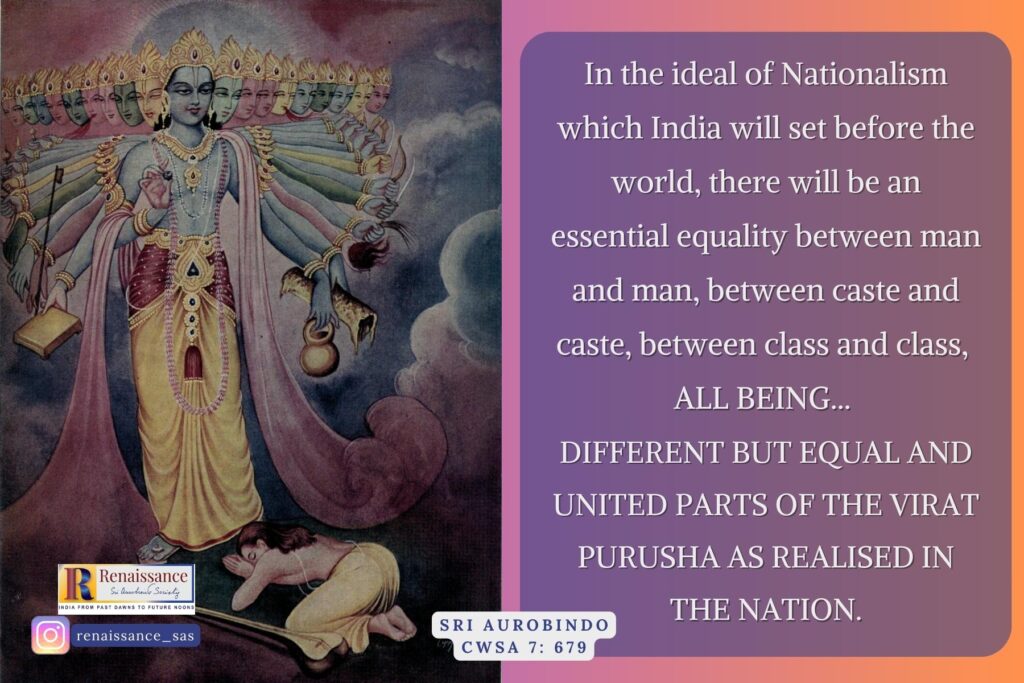Editor’s note: We feature an interesting conversation of Sri Aurobindo with a few disciples on the subject of vegetarianism, pity, compassion and more. The deeper point of the conversation is about cultivating an attitude of equality toward food preference in spiritual life.
This conversation dated 26 July 1923 is excerpted from ‘Evening Talks with Sri Aurobindo’, recorded by A. B. Purani, pp. 293-295. A letter of Sri Aurobindo addressing the same topic is also included.

Disciple: I had a long discussion with X on vegetarian and non-vegetarian diet. His argument was that those who take non-vegetarian diet are people devoid of pity. Life is sacred and no one who has realised the Spirit in all forms of life, has the right to take meat.
My reply was: Many Mahomedans and Christians who take non-vegetarian diet are not devoid of pity. Christ himself was not a vegetarian; diet has little to do with pity or cruelty. Secondly, the Jains, who are proverbially vegetarians, are not less cruel. Your argument that vegetables being lower forms of life can be eaten but animals being higher forms should not be eaten is based upon an arbitrary assumption about the higher and the lower forms of life. It is a creation of human mind. All life is life.
Disciple: X would have taken fish if it had been a vegetable.
Sri Aurobindo: It is absurd to make food such an important thing in the spiritual life. It is a secondary matter whether one takes vegetarian or non-vegetarian diet, so far as the spiritual life is concerned.

The real thing is equality or Samatā. If that is there then it is immaterial whether one takes fish or vegetarian diet. Philosophically, it is meaningless to say this has more life and that has less.
Disciple: But the animals have a more evolved life than the trees.
Sri Aurobindo: Not life but mind. Life is more manifest in the plant, in some respects, than even in man. Only, the mind is not evolved.
Disciple: The question is of vital repulsion. One can say he feels repulsion in killing an animal or he feels the animal nearer to him. But that would not prove that the plant when killed suffers less. It is only because man is not able to see the suffering of the plant that he feels the repulsion less, perhaps. All these things are due to Samskaras — previous impressions. The plain fact is that one cannot live unless he takes some kind of life. All these arguments are only intellect trying to justify old Samskaras.
Disciple: You spoke of Samatā. Why should one establish equality in the Prana, the Vital, before one does it in the mind?
Sri Aurobindo: Why should he not, if he can? It is not that one has to wait and establish equality on all planes at once, at one time.
Disciple: Is it necessary to wait till the Yoga is perfect in order to take fish?
Sri Aurobindo: I do not understand why one should. Very few people realise the true meaning of Samatā.
By Samatā is meant a certain attitude of the whole being towards the world and its happenings. This world is full of so many things which are horrible and terrible. Samatā means that one should be able to look at them from a certain poise without being perplexed or moved.
It does not mean that one will go on killing others indiscriminately or out of a personal motive. That would be untruth. But it means that one must be able to look at things without being moved.

What X calls ‘pity’ is something quite different from compassion and both are different from Samatā which is an attitude of the whole being.
Pity and sentimentalism are results of nervous repulsion, some movement in the vital being. I myself, when I was young, could not read anything related to cruelty wihout feeling that repulsion and a feeling of hatred for those who practised it. I could not kill even a bug or a mosquito. This was not because I believed in Ahimsa but because I had a nervous repulsion.
Later, even when I had no mental objection, I could not harm anything because the body rejected the act. When I was in jail I was subjected to all sorts of mental tortures for the first fifteen days. I had to look upon scenes of all kinds of suffering and then the nervous repulsion passed away.
Compassion is something different. It comes from Above. It is a state of sympathy for the suffering of man and the suffering that is on earth and there is an idea of helping it as far as one can, whenever one can in his own way. It is not like pity. It is like the Gods who look upon human suffering from above, unmoved.
That compassion can also destroy and it destroys with compassion as Durga does the Rakshasas. There can be no pity there.
Many times the Rakshasa may come and ask you to save him, he may even ask you to transform him — as some beings asked the Mother in her vision — by your spiritual power. If you try that, all the power goes to the Rakshasa and you may become powerless. When these vital beings incarnate in men then true compassion would not prevent you from killing them.
That the vegetable kingdom has got life is not something new to know, and it is not necessary to acquire Samatā to take fish. I used to take it when I was a child and when I had no Samatā. What is required is: one should have no repulsion. As a matter of fact I cannot take fish nowadays, but that means nothing. I give it to the cats all right.
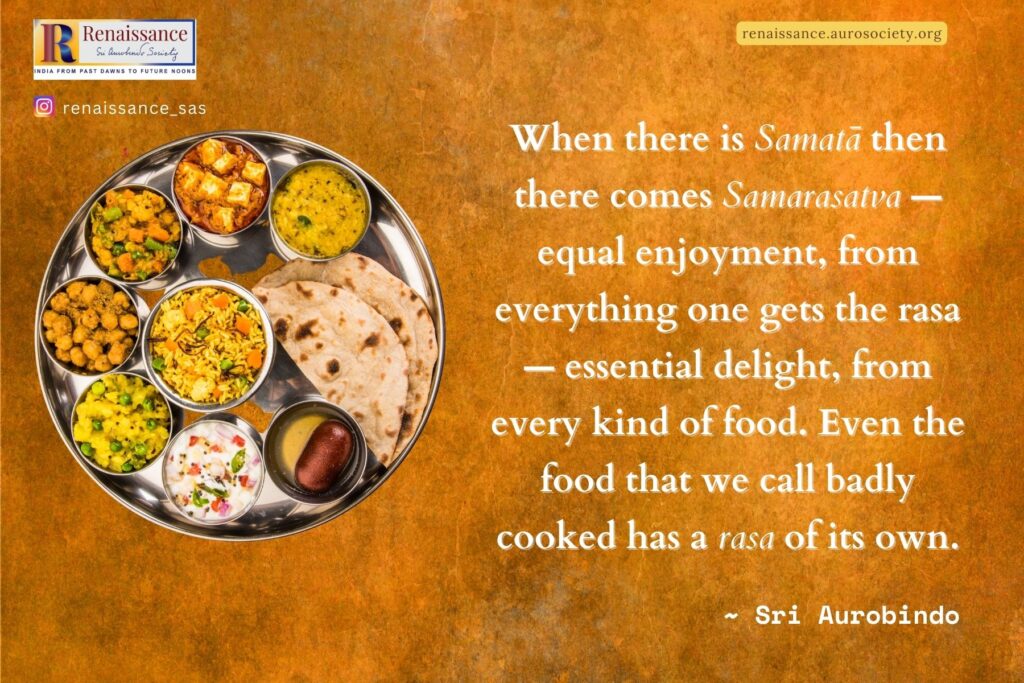
When there is Samatā then there comes Samarasatva — equal enjoyment, from everything one gets the rasa — essential delight, from every kind of food. Even the food that we call badly cooked has a rasa of its own.
But one can agree to a little bit of tact. It is no use casting fish in the face of a Jain or forcing smoke in the face of an orthodox Tamil Brahmin.
Also read:
Equality and Relations with Others: Advice from Sri Aurobindo
Yogic attitude toward food
If you want to do Yoga, you must take more and more in all matters, small or great, the Yogic attitude. In our path that attitude is not one of forceful suppression, but of detachment and equality with regard to the objects of desire.
Forceful suppression (fasting comes under the head) stands on the same level as free indulgence; in both cases, the desire remains; in the one it is fed by indulgence, in the other it lies latent and exasperated by suppression.
It is only when one stands back, separates oneself from the lower vital, refusing to regard its desires and clamours as one’s own, and cultivates an entire equality and equanimity in the consciousness with respect to them that the lower vital itself becomes gradually purified and itself also calm and equal.
Each wave of desire as it comes must be observed, as quietly and with as much unmoved detachment as you would observe something going on outside you, and must be allowed to pass, rejected from the consciousness, and the true movement, the true consciousness steadily put in its place.
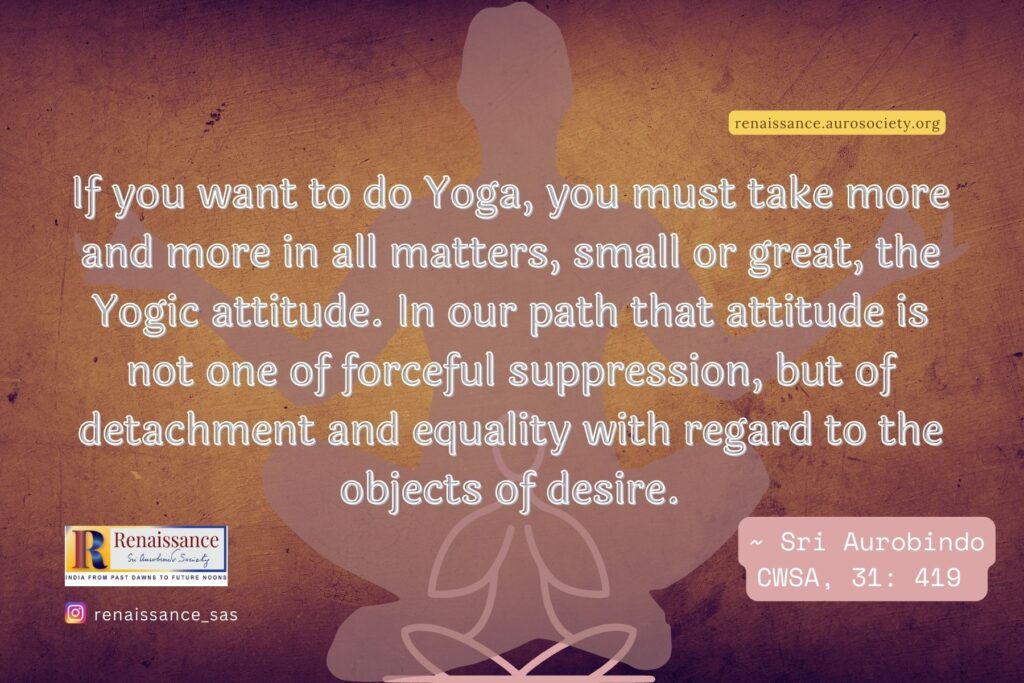
The vital of most people is of this kind [too weak to restrain its desires for pleasure], except in a few who are indifferent to sex or to food desire or to both, by temperament and nature.
There is always something in the lower vital which is recalcitrant and takes a pleasure in following its own way and disregarding the higher dictate, and there are always external forces hostile to the Yoga which try to take advantage of its obscurities, revolts and weaknesses.
Neither neglect this turn of the nature (food desire) nor make too much of it; it has to be dealt with, purified and mastered but without giving it too much importance.
There are two ways of conquering it—one of detachment, learning to regard food as only a physical necessity and the vital satisfaction of the stomach and the palate as a thing of little or no importance; the other is to be able to take without insistence or seeking any food given and to find in it (whether pronounced good or bad by others) the equal rasa, not of the food for its own sake, but of the universal Ananda.
But the latter comes usually only when one can live in the cosmic consciousness or rise into the Overmind—and for this you are not yet ready. So the first way is the one you should keep in view.

~ Design: Beloo Mehra

